
Subalternity and Representation: Arguments in Cultural Theory
John Beverley
Dismissed by some as simply another new fashion in the critique of culture and by others as a postmarxist heresy, subaltern studies began with the work of Ranajit Guha and the South Asian Subaltern Studies collective in the 1980s. Beverley’s focus on Latin America, however, is evidence of the growing province of this field. In assessing subaltern studies’ purposes and methods, the potential dangers it presents, and its interactions with deconstruction, poststructuralism, cultural studies, Marxism, and political theory, Beverley builds his discussion around a single, provocative question: How can academic knowledge seek to represent the subaltern when that knowledge is itself implicated in the practices that construct the subaltern as such? In his search for answers, he grapples with a number of issues, notably the 1998 debate between David Stoll and Rigoberta Menchú over her award-winning testimonial narrative, I, Rigoberta Menchú. Other topics explored include the concept of civil society, Florencia Mallon’s influential Peasant and Nation, the relationship between the Latin American “lettered city” and the Túpac Amaru rebellion of 1780–1783, the ideas of transculturation and hybridity in postcolonial studies and Latin American cultural studies, multiculturalism, and the relationship between populism, popular culture, and the “national-popular” in conditions of globalization.
This critique and defense of subaltern studies offers a compendium of insights into a new form of knowledge and knowledge production. It will interest those studying postcolonialism, political science, cultural studies, and Latin American culture, history, and literature.
Product Details
About John Beverley
Reviews for Subalternity and Representation: Arguments in Cultural Theory
Edward Baker
Arizona Journal of Hispanic Cultural Studies
“Bringing together aspects of cultural studies, Latin American studies, postcolonial theory, and subaltern studies, this is an important book. . . .”
K. Tölölyan
Choice
"John Beverley’s Subalternity and Representation is an important and timely work. . . . It is, unquestionably, an invaluable addition to the field of cultural studies particularly for academic institutions interested in creating and/or maintaining dynamic programs capable of responding to the ever-changing landscapes of culture and identity. So too, for Latin American studies, Subalternity offers the opportunity to engage more fully and more critically the myriad of experiences and expressions that make up this New World."
Shelly Jarrett Bromberg
Jouvert
"The tensions in Beverly's work indicate not so much a personal failure as the stubbornly difficult nature of the political and theoretical problems he investigates. Finally, the most important lesson he wishes us to learn-that academics must assume 'a new kind of responsibility for what we say and do'-is one with which even his harshest critic could agree."
Joseph Flanagan
interventions
